Search results for "Cotizador de seguros para autos Clovis CA llama ahora al 888-430-8975 Cotizar seguro de auto en linea Auto seguro Ing seguros coche Costo de seguro de auto Contratar seguro online Seguro automotriz"
Time to go
29 June 2015 | Greetings
[kml_flashembed publishmethod=”static” fversion=”8.0.0″ movie=”https://booksfromfinland.fi/wp-content/uploads/2015/06/Books_Kesabanneri_2015.swf” width=”590″ height=”240″ targetclass=”flashmovie”]  [/kml_flashembed]
[/kml_flashembed]
Animation: Joonas Väänänen
We’ve often thought of editing Books from Finland as being a bit like throwing a party.
It’s our job to find a place to hold it, send out the invitations and provide the food and drink.
It’s your job to show up and enjoy.
![]()
Books from Finland is a party that’s been running since 1967 – for nearly fifty years.
In that time, we’ve served up almost 10,000 printed pages and 1,500 posts, a wide-ranging menu of the best Finnish fiction, non-fiction, plays and drama, accompanied by essays, articles, interviews and reviews.
We’ve had a ball, and to judge by the letters and emails we’ve received from many of you, you’ve had a good time too.
But now it’s time to go: the landlord, to stretch the metaphor, has called in the lease on our party venue. Faced with funding cuts in the budget of FILI – the Finnish Literature Exchange, which has since 2003 been Books from Finland’s home – the Finnish Literature Society has decided to cease publication of Books from Finland with effect 1 July 2015. Our archive will remain online at this address, and the digitisation project will continue. We won’t be adding any new material, though; this is, literally, the last post.
![]()
The party may be over, the lights and music turned off – but what about the partygoers?
They are doing what partygoers always do: they – we – are moving on.
Readers and writers, photographers and illustrators, everyone who’s helped, supported and enjoyed Books from Finland, thank you!
So long. See you around.
Hildi Hawkins & Leena Lahti
What do YOU think?
8 April 2011 | This 'n' that

Illustration: Joonas Väänänen
Dear Reader:
we would love to know what you think about Books from Finland and what it means to you.
You can of course always send us suggestions and comments – interactivity is one of the great bonuses of being online – but we’d like to ask you some specific questions so that we can build up a picture of who reads our website, as well as your likes and dislikes.
We’ll start now, posting a question each month – see the sidebar on our main page. Please participate!
The Editors
New from the archive
26 March 2015 | This 'n' that
This week’s pick is a comic short story by Martti Joenpolvi about the gender divide
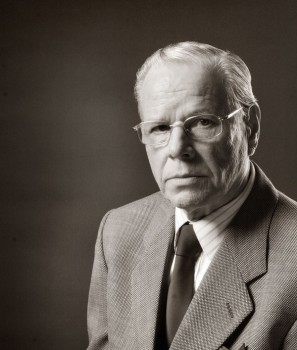
Martti Joenpolvi.
Photo: Janne Aaltonen.
We first published this short story by Martti Joenpolvi, an acknowledged master of the genre, in 1989; it comes from the collection Pronssikausi (‘The bronze age’, 1988), which was nominated for the Finlandia Prize.
The subject – the story is about a man taking his mistress on a secret visit to his summer-house – provides plenty of opportunity for sly humour. But it’s a more unsettling read in 2015 than we’re guessing it was twenty-five years ago – not so much for the plot itself, which makes ironic fun of the idea of woman-as-chattel, as for the characterisation, which subtly places the woman exactly where the story does.
Enjoy!
*
The digitisation of Books from Finland continues, with a total of 375 articles and book extracts made available online so far. Each week, we bring a newly digitised text to your attention.
New from the archives
13 February 2015 | This 'n' that

Daniel Katz. Photo: Veikko Somerpuro/WSOY.
In the midst of today’s richly cosmopolitan literary scene – we’re thinking of blockbusters like Sofi Oksanen’s Puhdistus (Purge, 2008), or Patjim Statovci’s Kissani Jugoslavia (‘My cat Yugoslavia’, 2014) (linkit) – it’s hard to imagine the colour and excitement represented by the work of Daniel Katz (born 1938) from the publication of his first book, Kun isoisä Suomeen hiihti (‘When grandfather skied to Finland’, 1969) onward. Characterised by dark humour, gentle irony, a wild imagination and a profound world view, Katz’s writing is informed but never defined by his outsider status as a Jew writing in Finnish.
Today’s story, taken from Katz’s book Talo Sleesiassa (‘A house in Silesia’) describes the journey taken by Erwin, a German Jew, to visit the home he lived in before the Second World War. Katz has a fine grasp of the ironies of history:
‘We arrived at the city of his birth, which currently is referred to as The City, for the sake of simplicity and tact: the town has – used to have, rather – two names, a German and a Polish, and one or the other party might take offence. My brother-in-law had in fact been born in a city whose name began with a B, though now it began with a W. Evolution of this kind is called phonetic history.’
The extract is accompanied by an interview of Daniel Katz by Daniel Katz.
*
The digitisation of Books from Finland continues apace, with a total of 356 articles and book extracts made available online so far. Each week, we bring a newly digitised text to your attention.
The pirate’s friend
11 March 2011 | Articles, Non-fiction
Intellectual property was hot stuff half a millennium ago, and not much has changed: Teemu Manninen takes a look at piracy and mercenaries in the age of electronic books
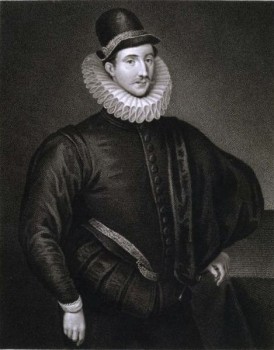
Sir Fulke Greville, 1st Baron Brooke (1554–1628) by Edmund Lodge. Photo: Wikimedia
In November 1586 Fulke Greville (later 1st Baron Brooke) sent Queen Elizabeth’s spymaster Sir Francis Walsingham a letter complaining about some ‘mercenary printers’‘ plans to print the romance novel Arcadia written by his friend (and Walsingham’s son-in-law) Sir Philip Sidney, who had died that very same year. This ‘mercenary book’ needed to be ‘stayed’, i.e. censored by the authorities, so that Sidney’s friends and relatives might take control, and also because publishing his works without consulting Greville or someone close to Sidney might damage his reputation or even his ‘religious honors’.
I rehearse this ancient tale because of its exemplary value for us today. From our point of view there seems nothing extraordinary about Greville’s actions: he is seeking to defend his friend’s literary estate from ‘mercenaries’ who steal intellectual property (IP): pirates. More…
Re-inventing the book: on the papernet, pod and the unbook
20 May 2009 | Articles, Non-fiction

Mind-map: using the papernet to produce books just for you. - Photo: Brian Suda
Just as Books from Finland finally goes online, the brightest minds of the internet are forecasting a return to paper. In the first of a series of articles, the poet and scholar Teemu Manninen celebrates the second coming of the book
Last week I did something I’ve never done before. I uploaded the manuscript of my third book on to the website Books on Demand, an internet print-on-demand (‘pod’) service, chose the format (a large 19×22 cm size with a hard cover), selected a picture for my cover, copy-pasted a poem by Clark Ashton Smith – an American science fiction and fantasy writer – on the back flap and ordered a copy. More…
A crafty Christmas
9 December 2011 | This 'n' that
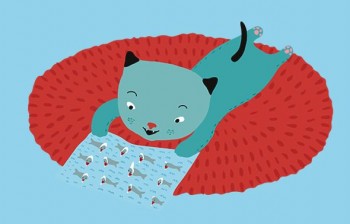
Advent calendar: make one yourself! Illustration: Virpi Penna
December: the street decorations, which have been up for a month, are beginning to look a little tawdry; the office party season is in full swing and most people are beginning to feel a little the worse for wear; there are only – let’s not count them, but far too few, shopping days left till Christmas.
Festive stress has already set in, and we’re not even halfway through the month.
That’s the scene in London, at least.
In Finland, Christmas and the weeks leading up to it are a much more muted, not to say calmer, affair. The customary greeting at this time of year is ‘rauhallisia joulunalusviikkoja’ – ‘peaceful before-Christmas weeks’ (well, who isn’t afraid of Xmas panic…) and Christmas itself has a quiet, candle-lit, somehow pious quality (even for non-believers).
The tone is set by the announcement of the Christmas peace from the city of Turku at noon on Christmas Eve, and many people still begin their celebrations with a visit to the graveyard to set a lighted candle on the graves of nearest and dearest before proceeding to the festivities: the traditional Christmas dinner (with its centrepiece of ham, not turkey), followed by a visit by Father Christmas, preferably in person.
In the harsh weather and short daylight hours of this time of year so far north, staying in has a lot to recommend it, and making things at home in preparation for Christmas has always been a popular pastime – with children in particular. This year the Thisisfinland website together with Tammi publishers, in conjunction with the writer Mysi Lahtinen and the children’s illustrator Virpi Penna, has produced an online advent calendar with a crafts project for each day up to Christmas Eve.
Whether it’s making a snowflake window from cut paper, simply painting birch-twigs white or, if the climate permits, celebrating Finland’s Independence Day (6 December) by making a lantern out of snow and a candle, these are projects that can be tackled by the young, and the young at heart, of any age.
While Joulupukki may feel slightly stressed (but with him, of course, it’s an occupational hazard), we wish you a peaceful pre-Christmas fortnight!
Rainer Knapas: Kunskapens rike. Helsingfors universitetsbibliotek – Nationalbiblioteket 1640–2010 [In the kingdom of knowledge. Helsinki University Library – National Library of Finland 1640–2010]
9 August 2012 | Mini reviews, Reviews
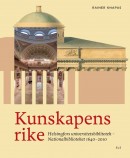 Kunskapens rike. Helsingfors universitetsbibliotek – Nationalbiblioteket 1640–2010
Kunskapens rike. Helsingfors universitetsbibliotek – Nationalbiblioteket 1640–2010
Helsingfors: Svenska litteratursällskapet i Finland, 2012. 462 p., ill.
ISBN 978-951-583-244-3
€54, hardback
Tiedon valtakunnassa. Helsingin yliopiston kirjasto – Kansalliskirjasto 1640–2010
[In the kingdom of knowledge. Helsinki University Library – National Library of Finland 1640–2010]
Suomennos [Finnish translation by]: Liisa Suvikumpu
Helsinki: Finnish Literature Society, 2012. 461 p., ill.
ISBN 978-952-222-272-5
€54, hardback
The National Library of Finland was founded in 1640 as the library of Turku Academy. In 1827 it was destroyed by fire: only 828 books were preserved. In 1809 Finland was annexed from Sweden by Russia, and the collection was moved to the new capital of Helsinki, where it formed the basis of the University Library. The neoclassical main building designed by Carl Ludwig Engel is regarded as one of Europe’s most beautiful libraries and was completed in 1845, with an extension added in 1906. Its collections include the Finnish National Bibliography, an internationally respected Slavonic Library, the private Monrepos collection from 18th-century Russia, and the valuable library of maps compiled by the arctic explorer Adolf Erik Nordenskiöld. Renamed in 2006 as Kansalliskirjasto – the National Library of Finland – this institution, which is open to general public, now contains a collection of over three million volumes as well as a host of online services. This beautifully illustrated book by historian and writer Rainer Knapas provides an interesting exposition of the library’s history, the building of its collections and building projects, and also a lively portrait of its talented – and sometimes eccentric – librarians.
Translated by David McDuff
Head in a cloud
27 May 2011 | Articles, Non-fiction
Thinking, reading, writing, buying… Teemu Manninen explores the new freedoms, literal and poetic, offered by cloud computing, where what you can do is no longer limited by what you happen to have on your computer

High in the sky: cumulus clouds. Photo: Michael Jastremski, Wikimedia
I’m sitting in a rocking chair on the porch of a cottage by a lake. My fingers tap and slide on the surface of a black glass panel, a kind of instrument used in the composing of literature. Each tap equals a letter, a series of taps equals a word, a symphony of taps becomes a paragraph, a paragraph an essay.
The glass panel remembers these letters and words and the writings they become, and knows them by their names, but it could also record anything I see or hear. I could even talk to it and it would understand my commands, as if some nether spirit were captured inside, a magic genie slaved to do my bidding. More…
Books from Finland to take archive form
22 May 2015 | In the news
The following is a press release from the Finnish Literature Society.
The Finnish Literature Society is to cease publication of the online journal Books from Finland with effect 1 July 2015 and will focus on making material which has been gathered over almost 50 years more widely available to readers.
Books from Finland, which presents Finnish literature in English, has appeared since 1967. Until 2008 the journal appeared four times a year in a paper version, and subsequently as a web publication. Over the decades Books from Finland has featured thousands of Finnish books, different literary genres and contemporary writers as well as classics. Its significance as a showcase for our literature has been important.
The major task of recent years has been the digitisation of past issues of the journal to form an electronic archive. The archive will continue to serve all interested readers at www.booksfromfinland.fi; it is freely available and may be found on the FILI website (www.finlit.fi/fili).
Much is written in English and other languages about Finnish literature: reviews, interviews and features appear in even the biggest international publications. The need for the presentation of our literature has changed. Among the ways in which FILI continues to develop its remit is to focus communications on international professionals in the book field, on publishers and on agents.
The reasons for ceasing publication of Books from Finland are also economic. Government aid to the Finnish literature information centre FILI, which has functioned as the journal’s home, has been cut by ten per cent.
Books from Finland was published by Helsinki University Library from 1967 to 2002, when the Finnish Literature Society took on the role of publisher. FILI has been the body within the Finnish Literature Society that has been responsible for the journal’s administration, and it is from FILI’s budget that the journal’s expeses have been paid.
Enquiries: Tuomas M.S. Lehtonen, Secretary General of the Finnish Literature Society, telephone +358 40 560 9879.
New from the archives
19 February 2015 | This 'n' that
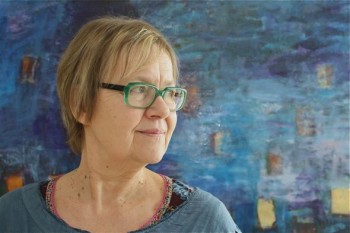
Tua Forsström. Photo: Mao Lindholm
Some weeks the digitisation project turns up material we’ve all but forgotten about; other times it’s like greeting an old friend. The poet Tua Forsström’s voice belongs in the second category: quintessentially feminine, wise, simultaneously vulnerable and strong, she is a quiet, watchful observer of everyday life, fixing the chimerical, the evanescent not with, it seems, but between, the words of her poems. This extensive selection of poems is introduced by her friend and fellow poet, Claes Andersson.
Born in Porvoo in 1947, Forsström publishes rarely. She won the Nordic Council Literary Prize in 1998 with Efter att ha tillbringat en natt bland häster (‘After having spent a night with horses’, 1997). Her breakthrough into the English-speaking world came in 1987 with her sixth collection, Snow Leopard (Snöleopard), which was translated into the English by David McDuff and published by Bloodaxe Books. We’ve featured her work regularly, including her most recent collection, En kväll i oktober rodde jag ut på sjön (‘One evening in October I rode out on the lake’, Söderströms, 2012), with an introduction by Michel Ekström.
*
The digitisation of Books from Finland continues apace, with a total of 358 articles and book extracts made available online so far. Each week, we bring a newly digitised text to your attention.
Instant erudition, or, who are you kidding?
2 September 2014 | Articles, Letter from the Editors, Non-fiction
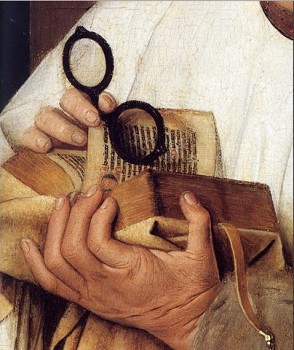
Time to read? Detail from Madonna with Canon van der Paele by Jan van Eyck (1439. The Groeninge Museum, Brugge). Wikipedia
In a recent ‘Saturday essay’ in the Helsingin Sanomat newspaper (9 August) journalist Oskari Onninen ponders the moral dilemma of pretending to be erudite. For example, who has the time to read books these days? ‘The Woolfs remain unread, Bergmans unwatched’, Onninen writes.
Our consumerist lifestyle forces us to follow the trends of ever-expanding, multiplying forms of entertainment. However, it is apparent that the need to know about culture in order to pass as a cultured, well-informed citizen still exists, to some extent at least.
According to Onninen, there is less and less time for unproductivity. ‘If one looks for measurable cost-benefit results from the reading of heavyweight fiction, the act of reading will certainly not always be worthwhile.’ Consuming art (reading books, going to art exhibitions, watching plays) requires time and effort, and how productive is that? More…
Where’s life best for women?
14 October 2011 | This 'n' that

Ice, lava & quality life for women: Iceland. Photo: Soila Lehtonen
In Iceland.
The Daily Beast – the online home of Newsweek Magazine – has compiled the rankings of the best and worst countries for women to live in. 165 countries were analysed by using five factors – justice, health, education, economics and politics – and awarding scores of 0 to 100.
Each category included between four and ten data points, depending on the reliable data points available. The results, published last month, show that for a woman Iceland is the best place: overall score was 100.0. Second was Sweden (99.2), third Canada (96.6), fourth Denmark (95.3) and fifth Finland (92.8). The next five were Switzerland, Norway, USA, Australia and the Netherlands.
The final ranking is based on how much better or worse a country is for women when measured against the average level of women’s rights for all 165 countries – of which the worst three are Yemen, Afghanistan and Chad.
Some progress seems to have been going on in the world lately; in politics women have become more visible. They will now even be allowed to vote in Saudi Arabia. (But there women are still not able to leave the country or work without a permission from a male relative – or drive a car.)
Iceland’s current prime minister is Johanna Sigurdardottir; the country’s score points for politics is 92.8, whereas Finland’s is 100.0.
However, justice and economics do not score as high in Finland as in Iceland. ‘Prevalence of intimate partner physical and sexual violence’ may cause the loss of points in the former case, and ‘women’s wages as a percentage of men’s’ in the latter.
Finland is the only country on the list with 100.0 points in politics: currently the president, 84 of the 200 members of the parliament and nine ministers out of 19 are women. So, it might be quite possible that women will make Finland climb up towards the top of the mountain – or rather, volcano?
New from the archives
19 February 2015 | This 'n' that

Jarkko Laine. Photo: Kai Nordberg
Our archive find this week is ‘The 101 year anniversary celebration’, a short story by Jarkko Laine.
‘Child of Marx and Coca-Cola’, ‘Nordic beatnik’, Jarkko Laine (1947-2006) published his first work, a volume of poetry entitled Muovinen Buddha (‘Plastic Buddha’) in the 1960s and was immediately hailed as the mouthpiece of his generation. He went on to make his career as a literary all-rounder – poet, writer, playwright, translator, long-time editor of the literary magazine Parnasso and chair of the Finnish Writers’ Union. His wryly ironic story, ‘The 101 year anniversary celebration’ tells the story of what every writer must dread: a guest appearance in a local library where literature from the local town, let alone further afield, is regarded with suspicion.
We’ve also unearthed a 1989 interview, by our late, genial editor-in-chief Erkka Lehtola with a grey-suited Laine who looks more like a civil servant than a 1960s radical – but still doesn’t let a day go by without writing.
*
The digitisation of Books from Finland continues apace, with a total of 360 articles and book extracts made available online so far. Each week, we bring a newly digitised text to your attention.

